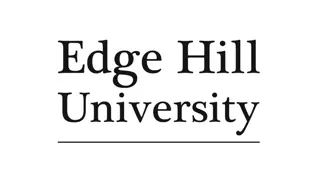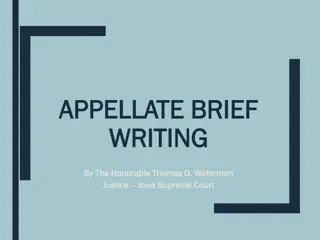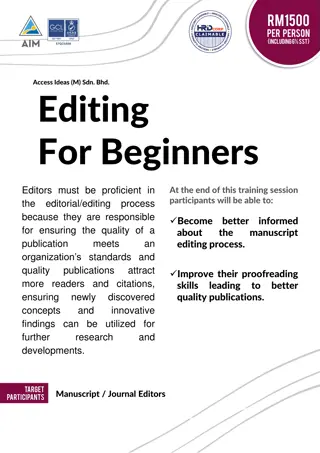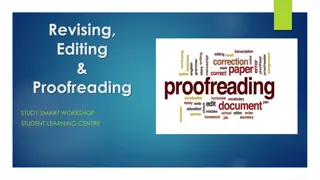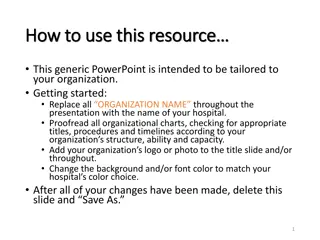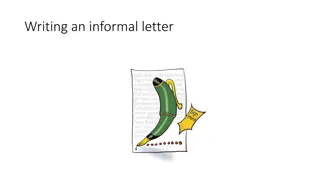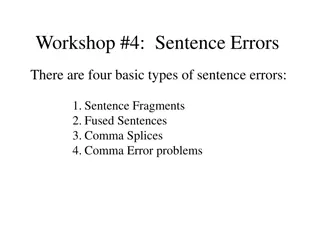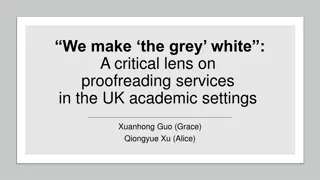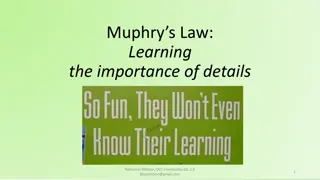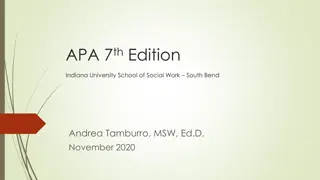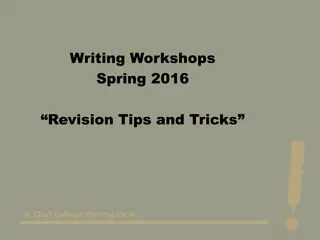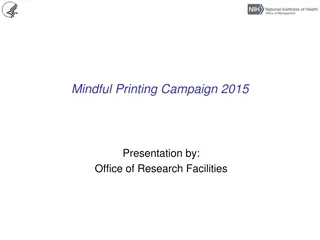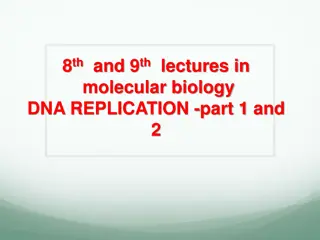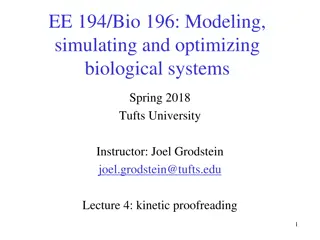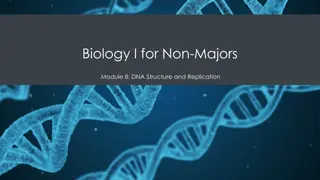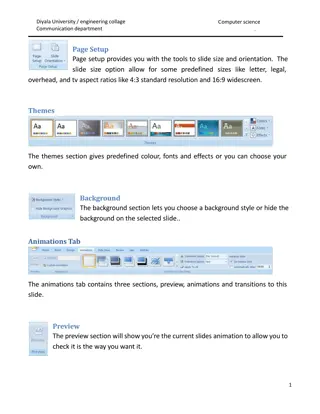Understanding the Academic Writing Process
Explore the stages involved in academic writing, from analyzing the title to proofreading the final draft. Learn about the basics of writing, types of academic writing, common reasons for writing, and text components like paragraphs and citations.
1 views • 42 slides
Enhancing Proofreading and Editing Skills for Academic Success
Explore the difference between editing and proofreading, understand the importance of proofreading, and learn strategies, tools, and techniques to enhance your proofreading abilities. Discover the self-evaluation process and why proofreading and editing are crucial for academic and professional succ
1 views • 22 slides
Crafting an Effective Appellate Brief: Strategies for Persuasion and Clarity
Understand the art of appellate brief writing as advocated by Honorable Thomas D. Waterman from the Iowa Supreme Court. The ultimate goal is to persuade the overworked judge by providing a clear and comprehensive brief that wins both heart and mind. Embrace accuracy, brevity, and clarity, while impl
4 views • 44 slides
Professional Editing Training with Dr. Shahreen Mat Nayan
Enhance your editing skills with a comprehensive training program led by Dr. Shahreen Mat Nayan, a distinguished communication and education professional. Gain insights into editing processes, proofreading techniques, writing styles, and formatting practices to elevate the quality of publications. D
0 views • 4 slides
Study Smart: Revising, Editing, and Proofreading Techniques
Enhance your writing skills by learning how to revise, edit, and proofread effectively. Explore key steps such as reviewing assignment requirements, assessing content flow, refining structure, and improving word choice to produce high-quality work.
2 views • 23 slides
Effective Research Poster Design Guidelines
Designing an effective research poster involves using appropriate headings, text sizes, and visual elements like images and charts. Follow the recommended print and screen formats for optimal results. The poster should include sections like Abstract, Introduction, Methodology, Results and Discussion
2 views • 22 slides
Enhancing Patient and Family Engagement at Your Hospital
Tailor this generic PowerPoint to your hospital by replacing all instances of ORGANIZATION NAME, proofreading charts, adding your logo, and adjusting colors. The presentation covers the importance of Patient and Family Advisory Councils (PFACs), their purpose, goals, and benefits in improving patien
1 views • 14 slides
Informal Letter Writing Tips and Example
Planning, ordering, layout, writing style, closing, and proofreading are key aspects of writing an informal letter. The provided example demonstrates a friendly, engaging tone with personal details and future plans, following the appropriate structure.
0 views • 5 slides
Understanding and Avoiding Sentence Errors
Learn about the four basic types of sentence errors - sentence fragments, fused sentences, comma splices, and comma error problems. Understand the difference between phrases and clauses, and how to avoid sentence fragments by combining phrases or dependent clauses with independent clauses. Discover
0 views • 12 slides
Unregulated Proofreading Services in UK Academic Settings
The increasing presence of international students at UK universities necessitates language support, yet the oversight of proofreading services has been lacking. Unregulated interventions by proofreaders raise ethical concerns, impacting student grades. This study explores various perspectives of stu
0 views • 26 slides
Understanding Muphry's Law: Importance of Details in Writing
Explore Muphry's Law, which states that any criticism of writing will contain errors, and learn how to avoid such mistakes through improved editing and proofreading techniques. Discover ways to enhance details detection and eyesight for better proofreading accuracy. Dive into eye exercises like Eye
0 views • 22 slides
Improving Your Writing: The Power of Revision
Writing is a continuous process of refinement. Revision involves revisiting your work from a fresh perspective to enhance its content and organization. Consistency is key to ensuring all ideas support the main theme while maintaining logical flow. Pay attention to content, organization, proofreading
0 views • 10 slides
Effective Writing Strategies for Social Work Professionals
Learn essential guidelines for scholarly and professional writing, including accurate punctuation, spelling, grammar usage, critical analysis, evidence-based arguments, and avoiding plagiarism. Understand the types of reports social workers write, importance of proofreading and editing, and the cons
0 views • 63 slides
Expert Tips for Successful Revision Process in Writing Workshops
Enhance your revision process with these expert tips for better writing outcomes. Learn the importance of time management, seeking feedback, taking a global approach, and focusing on proofreading in your writing workshops. Utilize strategies such as making a plan, consulting with allies, and startin
0 views • 18 slides
Mindful Printing Campaign 2015 - HHS Logo Style One
This presentation by the Office of Research Facilities introduces the Mindful Printing Campaign of 2015 by NIH. It encourages minimizing printing and maximizing recycling to reduce paper waste. The campaign offers tips on adopting a mindful printing attitude, hosting paperless meetings, proofreading
0 views • 14 slides
Understanding DNA Replication: Process and Significance
DNA replication is a fundamental process in all living organisms, crucial for genetic inheritance. This article covers the stages of DNA replication, including initiation, elongation, and termination. It discusses important concepts such as semi-conservative replication, proofreading mechanisms, and
0 views • 29 slides
Understanding Kinetic Proofreading in Biological Systems
Kinetic proofreading is a crucial mechanism by which the body accurately discriminates between closely-related molecules, such as mRNA codons and tRNA molecules in the process of protein synthesis. This process ensures that the correct molecules bind together, preventing errors that could have sever
0 views • 55 slides
Understanding DNA Structure, Replication, and Proofreading
Exploring the intricate world of DNA, this module delves into the structure of DNA, highlighting nucleotides, nitrogenous bases, and the double helix. It emphasizes how DNA stores genetic information in genes and undergoes replication through a semi-conservative model. The process of DNA replication
0 views • 13 slides
Diyala University Engineering Collage Communication Department Computer Science Tools
Page setup options provide tools for slide size and orientation, while themes allow customization of colors and fonts. Background choices include styles or no background. Create animations and transitions for slides. Start slide shows, set up monitors, and record narration. Features for proofreading
0 views • 5 slides
Writing Workshop: Refining Your Journal Entries with American Phrases
Embrace being a writer by incorporating American phrases and character-specific language from the book in your journal entries. Learn the nuances between proofreading and editing, utilize rubrics for self-assessment, and enhance your writing skills through vocabulary exploration and comprehension st
0 views • 7 slides
Mastering Press Releases: A Comprehensive Guide
Explore key elements of crafting impactful press releases, from media advisories to quotes and press lists. Learn the importance of proofreading and discover valuable resources for enhancing your PR strategies. Elevate your communication game with expert insights and practical tips in this comprehen
2 views • 5 slides

